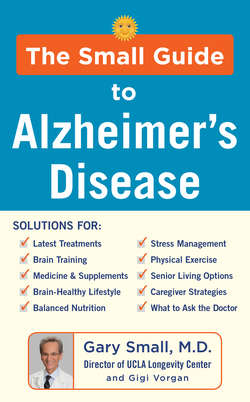Читать книгу The Small Guide to Alzheimer's Disease - Gary Small - Страница 10
На сайте Литреса книга снята с продажи.
The Brain Ages Gradually
ОглавлениеHelen, who forgot she left the bathtub filling, and most of her 50-something friends were all noticing memory slips. Usually they joked about it and accepted their forgetfulness as normal for a certain age. But Helen had moments when her concerns were greater, and her symptoms seemed worse when she was under stress or didn’t get enough sleep.
With each passing year, an individual’s risk for normal memory slips increases. By age 45, memory performance for the average person is significantly worse than their performance was in their mid-20s. And those objective memory declines correlate with what’s known as subjective memory—an individual’s self-awareness of their cognitive changes.
What causes these lapses is not entirely clear, but years of scientific inquiry have detailed brain changes that correlate with the symptoms. For example, the amyloid plaques and tau tangles, which Professor Alzheimer described in his original case of the disease, begin to accumulate in the brain decades before people are actually at risk for developing dementia symptoms. Neurotransmitters or brain messengers that permit brain cells to communicate begin to malfunction, and the brain’s circulatory system is less effective in transporting oxygen and nutrients from the heart to the brain cells. An aging brain also undergoes wear and tear from head trauma injury, oxidative stress, and heightened inflammation associated with aging.
Common Symptoms of Normal Brain Aging
• Forgetting names and faces
• Not remembering where you put things
• Failing to recall an appointment or plan
• Forgetting a word or name you should know that is on the tip of your tongue
By middle age, most people start noticing and joking about mild memory slips. But if these cognitive issues progress over the years, then mild cognitive impairment (MCI) may emerge, a transition stage between normal age-related forgetfulness and actual dementia. Most people over 50 have already experienced occasional memory slips, such as blanking on someone’s name or the title of a recently read book. If these problems worsen and become more frequent and severe, that’s when MCI kicks in.
People experiencing MCI struggle more with their memory. It may take them longer to get out of the house because they’re repeatedly searching for misplaced keys or glasses or checking that doors are locked and windows are shut. They may ask the same question more than once during a conversation. Despite these changes, however, these individuals are still able to function independently. They are able to compensate for their increasingly challenging mental abilities. However, when they can no longer compensate for these changes, they may progress to the next stage of brain aging, dementia, or a cognitive deficit that makes them dependent on others for their daily functioning.
Ten percent of people with MCI will develop dementia within a year. This means that in five years, 50 percent of people with MCI will get dementia. Using a brain positron emission tomography (PET) scanning method I developed with my research team at UCLA, it is possible to see into the living brain and watch how it progresses through these stages. As a patient’s cognitive symptoms escalate, scans can provide physical evidence of brain shrinkage, buildup of abnormal proteins, decline in cellular function, and other alterations. Using functional MRI scanning, we can observe how neural circuits start to work harder to overcome the encroaching brain disease and compensate for the neurons that have become dysfunctional by recruiting healthy ones to pitch in. Unfortunately, at some point this compensation mechanism breaks down and dementia takes over.
The figure illustrates the slow and steady memory decline that affects nearly everyone if they live long enough. Although age is the biggest risk factor for memory loss, everyone’s brain ages at a different rate. In fact, some 90-year-olds have a sharper memory than some 60-year-olds. The transitions between normal aging, MCI, and dementia are very gradual, and what distinguishes dementia from the earlier stages is that patients can no longer live on their own without help.
Memory decline is the main cognitive complaint that most people focus on as they get older, but deterioration in language skills, reasoning, spatial orientation, and concentration can disrupt lives as well. Sometimes patients with MCI experience greater difficulties with decision-making than with memory. Their judgment becomes impaired, and they may have trouble finding their way around familiar settings. Depression, anxiety, irritability, and other mood changes may emerge, and both cognitive and mood alterations only get worse as MCI progresses to dementia. Personality traits may become altered or exaggerated. For instance, a man who was mildly distrustful of strangers all his life may become paranoid that all strangers are out to get him.
Although normal aging does gradually worsen with time, it remains relatively stable for most people over the years. Despite this stability, some of the physiological changes associated with an aging brain can be observed using brain scanning technologies.
These categories were created to help doctors and scientists communicate and readily describe the degree of cognitive impairment each patient is experiencing. However, the progression of brain aging is slow and subtle in most cases, and the transitions from normal aging to mild cognitive impairment and dementia are not sudden but insidious. The conditions are defined in large part by the patient’s ability to function, and that ability will vary from person to person. An executive who has a personal assistant compensating for her cognitive slips may be able to function relatively independently much longer than someone without a personal assistant.
Some people have what’s been termed cognitive reserve. Their high intelligence allows them to compensate much longer as their brain aging progresses. I’ve seen several people with cognitive reserve who seem to function quite well—as if they have normal aging—even though their brain scans reveal Alzheimer’s disease that appears to be moderate in severity.
